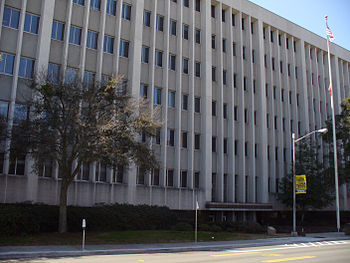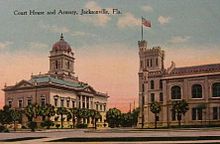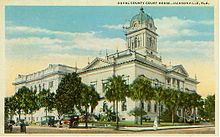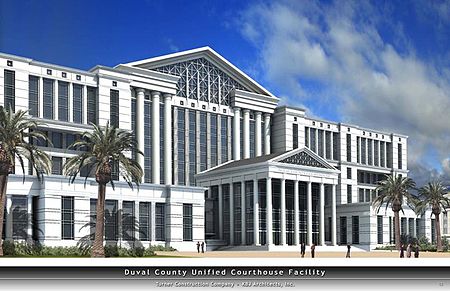- Duval County Courthouse
-
The Duval County Courthouse is the local courthouse for Duval County, Florida. It houses courtrooms and judges from the Duval County and Fourth Judicial Circuit Courts. The current facility is located in Downtown Jacksonville, Florida; a new facility currently under construction will open in 2012.
Duval County was created on August 12, 1822 and was formerly part of St. Johns County. Although the county's area was huge, it took more than twenty years before the first courthouse was constructed during the 1840s[1] A second courthouse was constructed in 1886, but was burned in the Great Fire of 1901. The third courthouse was constructed in 1902 and closed in 1958, when it was replaced by the current facility. A new courthouse funded by the Better Jacksonville Plan was planned in 2000, but budget issues and rising costs delayed its construction until 2009.
Contents
Previous courthouses
First
The first courthouse erected in Duval County was constructed of wood during the 1840s where Forsyth and Market Street intersect. It was burned to the ground during the Civil War.
Second
It took another twenty years before it was replaced with a brick building, constructed in 1886, which lasted until the Great Fire of 1901, which destroyed most of downtown Jacksonville. After the fire, the courthouse was one of the first buildings reconstructed, across the street from the old one. The exterior brick walls of the old courthouse remained mostly intact and were utilized in the creation of a new armory building. That structure is part of the present Lanier Building.
Third
Rutledge Holmes designed the 1902 courthouse, which had a stone exterior. The architect incorporated up to seven additional floors in the design, but the original building was never expanded. Instead, when additional space was required, an annex was added in 1914, nearly doubling the usable courthouse space.
Fourth
An architecturally modern courthouse was constructed on East Bay Street and dedicated in 1958, ten years before consolidation and at a time when the entire county's population was just over 450,000. During that same time, Jacksonville built the Haydon Burns Library, Friendship Fountain, Jacksonville Memorial Coliseum, the current Courthouse Annex and the CSX Transportation Building, making the city, “thoroughly modern”. The 1902 courthouse was demolished; the 1914 annex was preserved and later expanded to include the site of the 1902 courthouse and still functions as a county office building.[2]
New courthouse
The 2000 Census counted over three-quarters of a million people in Duval County, an increase of 67% since the prior courthouse opened. The Bay Street facility had been overcrowded for many years and additional space was desperately needed. State law required the local government to construct a new facility. Mayor John Delaney proposed the Better Jacksonville Plan, a $2.25 billion package of projects, including a new courthouse.[4] The referendum on the Better Jacksonville Plan passed on September 5, 2000, and planning for the courthouse commenced. Costs were estimated at $190 million, with another $20 million built into the budget for contingency. Construction was awarded to Cannon Design.
In 2003 Delaney left office and was succeeded by John Peyton. Construction continued under Cannon, but budget and size estimates fluctuated. Peyton stopped work on the courthouse complex on October 28, 2004, and fired Cannon and construction managers Skanska Dynamic Partners.[3] At the time, the project had not broken ground, but project design, property acquisition, site work and utility relocation had been completed, at a cost of $64.3 million. Peyton's office cited rising construction costs as part of the reason for the budget deficit.[5]
Peyton decided to throw out Cannon's original designs, including completed work, and proposed a new plan. The Jacksonville City Council approved increasing the courthouse budget to $263.5 million in 2006. The project was re-bid, and the team of Perry-McCall Construction and The Auchter Company were initially awarded the contract. When it was discovered that the Auchter Company had financial troubles, the contract was withdrawn. In an attempt to retain the contract, Perry-McCall and Auchter merged to form a new company, but Jacksonville's General Counsel rejected their plan because the new company did not bid on the project.[6]
Second place bidder, Turner Construction Company, which partnered with Technical Construction Services Group and KBJ Architects, was given an opportunity to negotiate a contract with the city in July 2007, by approval of the Competitive Sealed Proposal Evaluation Committee.[6] On November 16, 2007, the Courthouse Architectural Review Committee (CARC) convened to review the new options under consideration by the administration and voted 4-1 to pursue the mayor's recommendation to build one 850,000-square-foot (79,000 m2) facility on the existing LaVilla site using the design from KBJ Architects. Turner Construction was chosen as contractor.
Based on that recommendation and after intensive study, the Jacksonville City Council approved a $350 million county courthouse complex in April, 2008 that was supported by Mayor Peyton and Chief Circuit Judge Donald Moran. The council also agreed that any proceeds from the sale of the current riverfront courthouse and the City Hall annex be used to pay for the increased costs of the new courthouse construction.[7][8] The courthouse is expected to completed in 2012.
Financial history of the new courthouse
Original 2000 BJP budget $190,000,000 “vertical contingency” $ 21,000,000 added by John Delaney ** New Funding ** Court Facilities Trust Fund: $ 811,000 Court Documents Facility: $ 3,397,000 Traffic Fine Surcharge: $ 48,292,000 2nd Approved Budget: $263,500,000 (2004-1339) ** Still Needed ** AdditionalFunding: $ 86,500,000 (pending Council approval) TOTAL BUDGET APPROVED^: $350,000,000 (2008-1111) ^$64.3 million already spent to-date for land acquisition, utility relocation and previous design efforts [9]
Progress
Construction actually began in May 2009, with more than 400 workers engaged for over a year. As of June 27, 2010, construction was 37% completed, with the final pour of the concrete roof above the seventh floor. The completion date was established at May 2012, nearly a year later than Mayor Peyton hoped, but the project is within budget. When the mayor leaves office in 2011, the exterior of the building is expected to be complete, but the interior will require an additional ten months.[10]
As of September 23, 2010, nearly every piece of pre-cast exterior has been installed over the concrete structure on the front of the courthouse.[11]
The City's website stated on February 18, 2011 that interior construction of major systems was on schedule and 55% of the total project was complete, with the exterior work nearly finished.[12]
References
- ^ Information for the State of Florida: Duval County History and Information
- ^ Florida's 10th Judicial Circuit: Courthouses-Duval
- ^ a b Luce, Ann (November 12, 2004). Architects seeks to clear the air about courthouse project". Jacksonville Business Journal. Retrieved July 13, 2011.
- ^ http://jacksonville.com/tu-online/stories/050900/met_3016056.html
- ^ http://origin.firstcoastnews.com/news/local/news-article.aspx?storyid=35492&catid=3
- ^ a b "Design firm gets new shot at courthouse" Florida Times-Union, July 20, 2007
- ^ Kormanik, Beth: "Courthouse project approved" Florida Times-Union, April 23, 2008
- ^ http://jacksonville.com/tu-online/stories/042308/met_271204928.shtml
- ^ City of Jacksonville website: Better Jacksonville Plan-Courthouse
- ^ Galnor, Matt: "Duval County Courthouse rising after years of struggles" Florida Times-Union, June 27, 2010
- ^ Baldwin, Brian: "NTY Courthouse" Jax Observer
- ^ "STATUS (current February 18, 2011)" City of Jacksonville website, Better Jacksonville Plan
External links
Categories:- Buildings and structures in Jacksonville, Florida
- County courthouses in Florida
- Government of Jacksonville, Florida
- History of Jacksonville, Florida
- KBJ designed buildings
Wikimedia Foundation. 2010.




